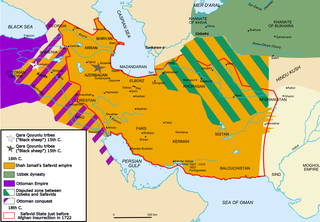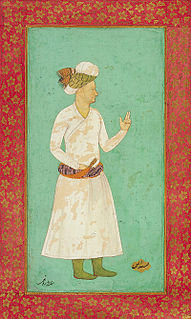Related Research Articles

Murad IV was the Sultan of the Ottoman Empire from 1623 to 1640, known both for restoring the authority of the state and for the brutality of his methods. Murad IV was born in Constantinople, the son of Sultan Ahmed I and Kösem Sultan. He was brought to power by a palace conspiracy in 1623, and he succeeded his uncle Mustafa I. He was only 11 when he ascended the throne. His reign is most notable for the Ottoman–Safavid War (1623–1639), of which the outcome would partition the Caucasus between the two Imperial powers for around two centuries, while it also roughly laid the foundation for the current Turkey–Iran–Iraq borders.

1588 (MDLXXXVIII) was a leap year starting on Friday of the Gregorian calendar and a leap year starting on Monday of the Julian calendar, the 1588th year of the Common Era (CE) and Anno Domini (AD) designations, the 588th year of the 2nd millennium, the 88th year of the 16th century, and the 9th year of the 1580s decade. As of the start of 1588, the Gregorian calendar was 10 days ahead of the Julian calendar, which remained in localized use until 1923.
Ahmad Pasha or Ahmed Pasha or Ahmet Pasha may refer to:
The table of years in literature is a tabular display of all years in literature for overview and quick navigation to any year.

The Ottoman–Safavid War of 1623–1639 was the last of a series of conflicts fought between the Ottoman Empire and Safavid Empire, then the two major powers of Western Asia, over control of Mesopotamia. After initial Persian success in recapturing Baghdad and most of modern Iraq, having lost it for 90 years, the war became a stalemate as the Persians were unable to press further into the Ottoman Empire, and the Ottomans themselves were distracted by wars in Europe and weakened by internal turmoil. Eventually, the Ottomans were able to recover Baghdad, taking heavy losses in the final siege, and the signing of the Treaty of Zuhab ended the war in an Ottoman victory. Roughly speaking, the treaty restored the borders of 1555, with the Safavids keeping Dagestan, eastern Georgia, Eastern Armenia, and the present-day Azerbaijan Republic, while western Georgia and Western Armenia decisively came under Ottoman rule. The eastern part of Samtskhe (Meskheti) was irrevocably lost to the Ottomans as well as Mesopotamia. Although parts of Mesopotamia were briefly retaken by the Iranians later on in history, notably during the reigns of Nader Shah (1736–1747) and Karim Khan Zand (1751–1779), it remained thenceforth in Ottoman hands until the aftermath of World War I.
Anthonie is a Dutch and masculine given name transliterated from Antonius in use in the Netherlands, Greenland, Suriname, Republic of Karelia, South Africa, Namibia, Belgium and Indonesia. The same spelling is a Norwegian feminine given name that is an alternate name to Antonie in use in Norway. The spellings Antonie and Anthonij were basically interchangeable in Dutch until the 19th century. Notable people with the name include:
The table of years in poetry is a compact directory of all "years in poetry" pages—decades and centuries prior to 1500.

Baghdad Eyalet was an Iraqi eyalet of the Ottoman Empire centered on Baghdad. Its reported area in the 19th century was 62,208 square miles (161,120 km2).

Mirza Mohammad Taqi, better known as Saru Taqi was a eunuch of Safavid Empire, who served as the Grand Vizier of the Safavid king (shah) Safi and the latter's son Abbas II until he was assassinated on 11 October 1645.
Bektash Khan, also known as Bektash Khan Gorji, was a Safavid official and gholam who served as the governor (beglarbeg) of Baghdad between 1631 and 1638, during the reign of Shah (King) Safi. His tenure was brought to an end in 1638 when the Ottomans captured the city during the ongoing Ottoman-Safavid War of 1623-39.

The Baghdad Province was a Velayat (province) of the Safavid Empire, centred on the territory of the present-day Iraq. Baghdad was the provincial capital and the seat of the Safavid governors.